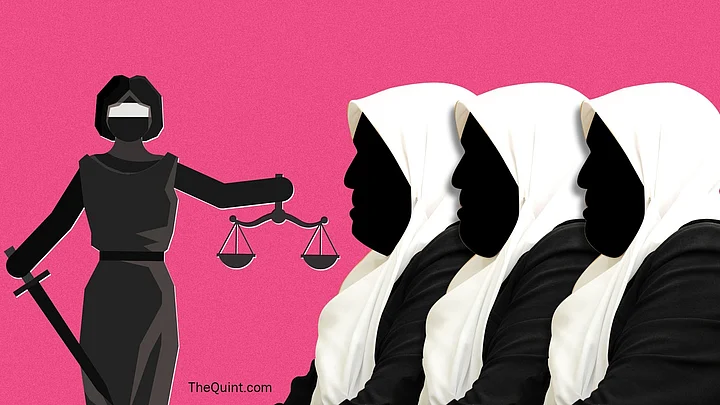In a landmark judgment on 22 August, the Supreme Court declared the practice of Triple Talaq “unconstitutional” and “un-Islamic”. The decision was reached with a 3:2 split by a five-judge bench of the Supreme Court.
The legal battle, which started with the 1978 Shah Bano case, seems to have reached a conclusion four decades later. Shah Bano was married in 1932 to Mohammed Ahmed Khan, a reputed lawyer in Indore. After 14 years of marriage, Ahmed Khan remarried. He continued to live with both his wives in the same house until 1975 when he forced Shah Bano, along with five of their children, to leave.
When Bano protested, Ahmed gave her Triple Talaq on 6 November 1978. She then reached out to him for support, to which Ahmed said that the alimony (meher) has already been given to her.
The 62-year-old Bano filed a criminal lawsuit against her husband with the Supreme Court the same year.
The battle to get Triple Talaq abolished gained new momentum in October 2015, when the Supreme Court decided to look into the matter of Muslim women facing gender-based discrimination within the community.
Here’s a breakdown of the legal course this battle took in the intervening years.
16 October 2015: Supreme Court bench asks Chief Justice of India to set up an appropriate bench to examine if Muslim women face gender discrimination in divorce cases, while dealing with a case of Hindu succession.
5 February 2016: Supreme Court asks then Attorney General Mukul Rohatgi to assist it on the pleas challenging constitutional validity of Triple Talaq, Nikah Halala and polygamy.
28 March 2016: Supreme Court asks Centre to file report of a high-level panel on 'Women and the law: An assessment of family laws with focus on laws relating to marriage, divorce, custody, inheritance and succession'. Supreme Court impleads various organisations, including All India Muslim Personal Law Board (AIMPLB), as parties in the suo motu matter.
29 June 2016: Supreme Court says Triple Talaq among Muslims will be tested on "touchstone of constitutional framework".
7 October 2016: For the first time in India's constitutional history, Centre opposes in Supreme Court these practices and favours a relook on grounds like gender equality and secularism.
14 February 2017: Supreme Court allows various interlocutory pleas to be tagged along with the main matter.
16 February 2017: Supreme Court says a five-judge constitution bench would be set up to hear and decide the challenge to Triple Talaq, Nikah Halala and polygamy.
27 March 2017: AIMPLB tells Supreme Court pleas were not maintainable as the issues fall outside judiciary's realm.
30 March 2017: Supreme Court says these issues are "very important" and involve "sentiments" and says a constitution bench would start hearing it from 11 May.
11 May 2017: Supreme Court says it will examine whether the practice of Triple Talaq among Muslims is fundamental to their religion.
12 May 2017: Supreme Court says the practice of Triple Talaq was the “worst” and “not desirable” form of dissolution of marriages among Muslims.
15 May 2017: Centre tells Supreme Court that it will bring a new law to regulate marriage and divorce among the Muslim community if Triple Talaq is struck down. Supreme Court says it will examine whether Triple Talaq was an essential part of religion under Article 25 of Constitution.
16 May 2017: AIMPLB tells Supreme Court that matters of faith cannot be tested on grounds of constitutional morality, says Triple Talaq a matter of faith for the last 1,400 years. Equates the issue of Triple Talaq with the belief that Lord Rama was born in Ayodhya.
17 May 2017: SC asks AIMPLB whether a woman can be given an option of saying 'no' to Triple Talaq at the time of execution of 'nikahnama'. Centre tells SC Triple Talaq is neither integral to Islam nor a "majority versus minority" issue but rather an "intra-community tussle" between Muslim men and deprived women.
18 May 2017: Supreme Court reserves verdict on Triple Talaq.
22 May 2017: AIMPLB files affidavit in Supreme Court saying it would issue an advisory to 'Qazis' to tell bridegrooms that they will not resort to Triple Talaq to annul their marriage. AIMPLB lists out in Supreme Court guidelines for married couples. These include "social boycott" of those Muslims who resort to Triple Talaq and the appointment of an arbitrator to settle marital disputes.
22 August 2017: Supreme Court by a majority verdict of 3:2 rules that divorce through Triple Talaq is void, illegal, unconstitutional and against basic tenets of the Quran.
(With inputs from PTI.)
(#TalkingStalking: Have you ever been stalked? Share your experience with The Quint and inspire others to shatter the silence surrounding stalking. Send your stories to editor@thequint.com or WhatsApp @ +919999008335.)
